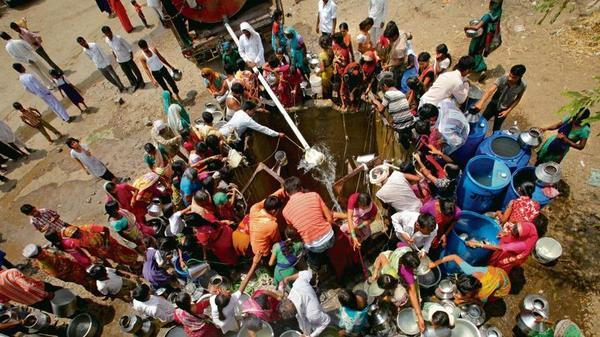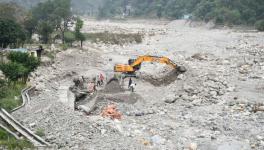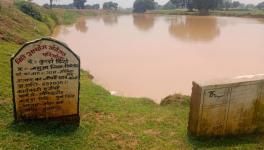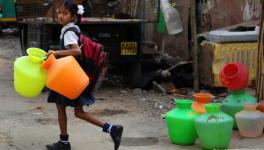Improvement in Water Management Index Not Enough, Says Report

According to the Composite Water Management Index (CWMI) 2019 released by the Niti Aayog on Friday, August 23, even though the states across the country are making progress in water management, the overall performance still remains well below what is required to adequately tackle India’s increasing water challenges.
The report said that even though India is home to approximately 17% of the world’s population, it has only 4% of the world’s freshwater resources. Proper management of these resources for this huge population is one of the most important responsibilities of the government. It said, “It is estimated that about two lakh people die every year due to inadequate water, sanitation and hygiene. In 2016, per person disease burden due to unsafe water and sanitation was 40 times higher in India than in China and 12 times higher than in Sri Lanka.”
The report also added that the country generates huge amounts of waste water annually. This, along with mismanagement of the generated waste water which leads to contamination of the groundwater, lack of liquid waste management, poor sanitation conditions and poor hygiene habits have contributed to a significant portion of the population suffering from water-borne diseases.
Of the 25 states and two union territories assessed in the CWMI, 80% have improved their water management scores in recent years, with an average improvement of more than 5.2 points. However, despite this improvement, 16 states still score less than 50 points on the index (out of 100) and fall in the low-performing category. The low-performing states, which include Uttar Pradesh, Bihar, Jharkhand, Odisha, Delhi, Rajasthan, Nagaland and Meghalaya, collectively account for around 48% of the population, 40% of the agricultural produce, and 35% of economic output of India.
Also read: Despite Heavy Rain, Level of Water Reservoirs Still Below Normal in Ten States
The CWMI measures performance of the states on a set of water indicators and nine themes — source augmentation and restoration of water bodies, source augmentation (groundwater), major and medium irrigation, watershed management, participatory irrigation practices, sustainable on-farm water use practices, rural drinking water, urban water supply and sanitation, and policy and governance.
“Top performers such as Gujarat, Andhra Pradesh, Madhya Pradesh, and Himachal Pradesh have further increased their scores over the last three years, with improvement ranging from 4 to 11 points. On the other end, out of the 14 low-performing states from FY 2015-16, only Haryana, Goa, and Telangana have been able to cross the 50-point threshold. Jharkhand, Uttar Pradesh, Odisha, Bihar, Nagaland, and Meghalaya still score less than 40 points, and the average improvement in low-performing category over the last three years stands at 3.1 points, lower than 5.2-point average improvement observed across states,” said the report.
It also pointed out that the larger economic contributors across the country have low water management scores, and this can hamper India’s economic progress. It said, “Uttar Pradesh, Rajasthan, Kerala, and Delhi, 4 of the top 10 contributors to India’s economic output, have scores ranging from 20 points to 47 points on the CWMI. These four states collectively account for over a quarter of India’s population, and reduced economic activity will reduce employment and livelihood opportunities in these large population clusters.”
It was also pointed out in the report that food security is also at risk because of the poor water management in the country. The large agricultural producers are struggling to manage their water resources effectively. “None of the top 10 agricultural producers in India, except Gujarat and Madhya Pradesh, score more than 60 points on the CWMI. This is concerning given that assessment on almost half of the Index scores is directly linked to water management in agriculture,” it said.
Also read: India Facing "Extremely High" Water Stress: Report
The report concluded with the statement that the states need to upgrade their water management practices to show outcomes and not just outputs. It said that several disparities exist in water management amongst states. It added, “States also need to track the overall outcomes of their policy making and water administration, and make sure that improved legal, administrative, and operational outputs are leading to outcomes like increased groundwater levels, rejuvenated surface water sources, and improved piped water supply for rural and urban inhabitants. Without an outcome-based approach, state investments in water management are unlikely to have a desired positive impact on their water situations.”
Get the latest reports & analysis with people's perspective on Protests, movements & deep analytical videos, discussions of the current affairs in your Telegram app. Subscribe to NewsClick's Telegram channel & get Real-Time updates on stories, as they get published on our website.
























